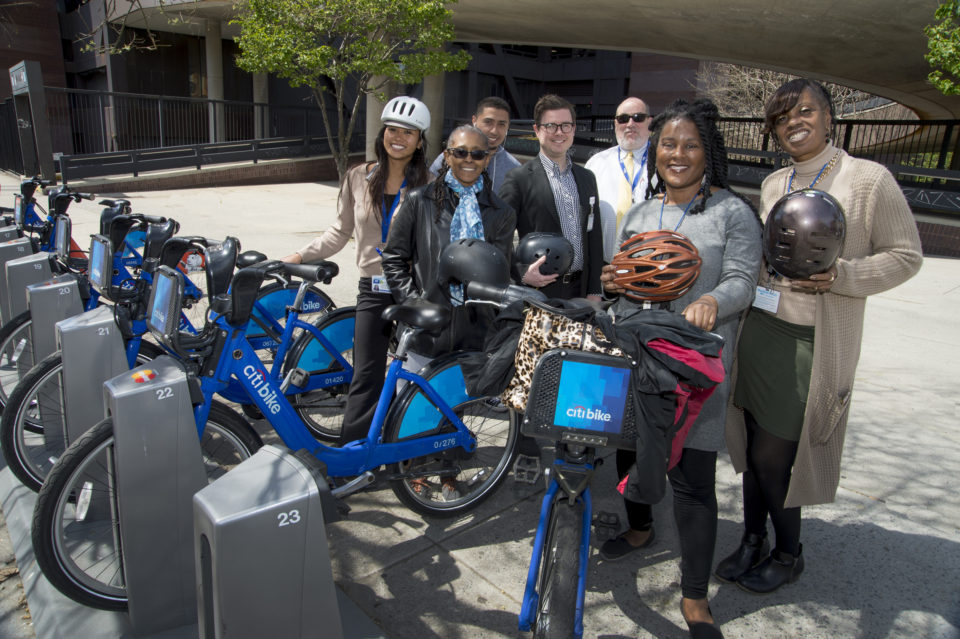How one nonprofit is selling bike share to Bed-Stuy: in the workplace
by April Corbin, PeopleForBikes equity writer
July 8, 2016

Woodhull Medical Center is another employer who’s signed up for the Citi Bike corporate subsidy program.
“How do you get mass numbers?”
That is the question Tracey Capers of Bedford Stuyvesant Restoration Corporation pondered after a year of grassroots outreach encouraging underserved populations in Brooklyn to embrace Citi Bike. That outreach focused largely on large community events where ambassadors of bike share could interact with people one-on-one. It yielded positive outcomes, but Capers wanted to dream bigger.
She continues, “Who has the potential to get large numbers signed up? Who can offer benefits?”
The answer: Employers.
Restoration Corporation has now launched a new effort to help Brooklyn employers sign up for Citi Bike’s corporate subsidy program. The Citi Bike program allows companies to either fully or partially subsidize an annual bike share membership for their employees. Restoration Corporation is augmenting that with community rides, bike safety classes and other outreach efforts aimed at getting employees comfortable and excited about riding.
Capers sees it as mutually beneficial. Employees get the health benefits that come with riding a bicycle, which translates to lower insurance costs for their employer.
Having another commuting option may also help people get to work in less time, or on time when there are delays in other public transit like the bus.
One of the first employers to work with Restoration Corporation on embracing the corporate subsidy program was Interfaith Medical Center. Associate Director of Grants Management Benjamín González says the community hospital is always looking for ways to enhance quality of life for employees and offering access to Citi Bike fit right into that mission. They hope to have somewhere between 50 to 75 employees participate in the program.
“Employees have responded enthusiastically,” he says.
Specifically, employees are excited about the community bike rides their employer is co-sponsoring every first Wednesday of the month this summer. At these, clinicians, support staff and community members come together for neighborhood rides in Central Brooklyn to improve community health and promote physical activity. After one ride, an employee noted that it had been more than 20 year since she had ridden a bicycle. Another said they had “been waiting for something like this because I need to get more exercise.”
Low-wage hospital workers will benefit directly from the program, but Capers believes the equity impact could be even broader. She hopes that as doctors and nurses embrace bike share, they will suggest it to their low-income patients, maybe through something similar to Boston’s Prescribe-A-Bike program.
With that said, Restoration Corporation isn’t only targeting hospitals for this corporate subsidy outreach. Small business owners have also jumped onboard. One of them is TiffanyJoy Murchison, who runs a boutique public relations and marketing firm in BedStuy that specializes in nonprofits, fashion, arts and entertainment.
Like González, she says she does what she can to keep her employees happy, and she believes a Citi Bike membership is a perk many will appreciate.
“I have a lot of staff that are interns,” she explains. “A lot of them are in college. If there’s any way I can reduce the expense of living and traveling in New York City, that’s a good thing. The yearly cost of a bike share pass is not much more than a monthly train pass. It’s more cost effective, especially if they are getting it subsidized.”
Murchison adds that promoting a healthy, active lifestyle among her young interns is equally important.
“I work out and I like to stay healthy,” she says. “I’m really an advocate for that. It seems generations are becoming less and less active with video games and all that stuff, so for me it’s threefold. They are exercising. They are getting around the city for a lot less. And it’s just a cool incentive to offer.”
The Better Bike Share Partnership is a JPB Foundation-funded collaboration between the City of Philadelphia, the Bicycle Coalition of Greater Philadelphia, the National Association of City Transportation Officials (NACTO) and the PeopleForBikes Foundation to build equitable and replicable bike share systems. Follow us on Facebook, Twitter and Instagram or sign up for our weekly newsletter. Story tip? Write april@peopleforbikes.org
